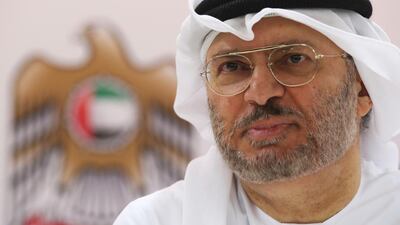"We need to create an Arab consensus." So said UAE Minister of State for Foreign Affairs Dr Anwar Gargash in an exclusive interview with The National. And rarely in modern history has there been a more pressing need. The region today sits at a pivotal moment, with Libya overrun by warring militias, the future of Palestinian statehood at stake, continuing wars in Yemen and Syria and the nefarious adventurism of Iran. "There is a necessity for core Arab countries to work harder together to bring an Arab voice to the several crises that are around us," Dr Gargash continued.
It is true that this region requires new thinking to solve old conflicts and prevent new ones. And, too often, Arab voices are not heard. Take Syria, where the needs of ordinary, desperate civilians have been eclipsed by the power leveraged by Russia, Iran and Turkey. T
here is great strength in unity as well as precedent – from the GCC to the Saudi-Emirati Coordination Council – for meaningful economic, diplomatic and military co-operation between the great powers of the Arab world.
Such a prospect has drawn a step closer in recent months with reports that US President Donald Trump aims to support the creation of a Middle East strategic alliance, nicknamed the Arab Nato, conveniently shifting responsibility for regional stability to GCC countries, Egypt and Jordan.
The US is keen to consolidate its firm stance on Iran and build a bulwark against Iranian interference but while military co-operation would bring more security to the Arab world, an Arab Nato would breed partnerships in other fields, from energy, food and water to trade and growth. In the face of regional threats, it would send a powerful message to the international community that the future of the Arab world is firmly in the hands of its own people.
No doubt there are obstacles to deeper integration, not least the looming presence of Qatar which is, in Dr Gargash’s words, “still reluctant to cut its umbilical cord and support of extremism”. Moreover, with 22 states spread widely in terms of geography and priorities, cohesive action could prove challenging.
But that is no reason not to try. Because, despite the criticisms levelled at it, Nato stands today as one of the world's most successful multilateral organisations. And while some leaders within it, such as Turkish President Recep Tayyip Erdogan, might quarrel with their partners, the institution itself is stronger than the sum of its parts.
Whatever form Arab co-operation takes, be it a unified fighting force or an arena for diplomacy, it is time for this region to realise that common ground between nations should, and can, supersede differences. The Arab world must take responsibility for its own future. And platitudes must give way to concrete action on all the issues that risk tearing the region apart.

